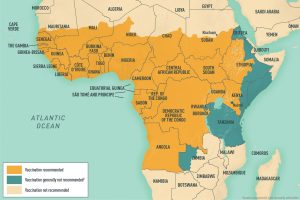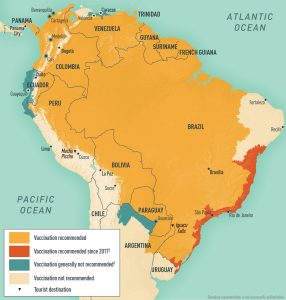Vaccinations
If you have made an appointment, please read this below as it will make your visit easier to understand and more pleasant when discussing travel vaccinations.
- We stock all vaccines and you can receive them at your 1st appointment (we don’t need to order in for you) including the yellow fever vaccine (costs $185)
- If you are unsure of what vaccines you may have had in the past or lost your vaccine records or ‘well child book’, we can request a blood test to test for immunity.
- Our travel doctor will advise you on the vaccines necessary depending on you, your health, your trip and your activities.
- We only give you what you really need; we minimise your pain and expense by tailoring your immunisations for you, your health and your trip.
- We will offer you combination vaccines if possible (i.e. one injection covering several diseases)
- You decide what vaccines you wish to have depending on your budget and the degree of protection you want (not fear factor)
- Please don’t commit to a course of vaccinations if you cannot complete e.g. hepatitis
- It is important to first be up-to-date with your foundation age appropriate wellness vaccinations before you consider specific travel vaccines e.g. tetanus, pertussis (whooping cough- ‘the 100 day cough’), measles, chicken pox, HPV, shingles, strep. pneumonia, RSV, meningitis (young + older) and hepatitis B (~ 110 000 New Zealanders have chronic hepatitis B and the virus can be on unclean eating utensils),
- Recommended travel vaccines vary for different countries, and you will be advised. Some vaccines need a series to be protected; and can be accelerated if ‘time’ constraints
- Some vaccines are administered ‘off label’ i.e. deviates from packaging label and may be fractionated or administered differently.
- Rabies is the #1 recommended travel vaccine (if one is immune to hepatitis A+B), followed by hepatitis, typhoid, oral E.Coli vaccine (for travellers diarrhoea).
- Hepatitis A $130, Hepatitis B $75, Hepatitis a+B (Twinrix) $135, Typhoid $115.
- Vaccine costs vary from $75 to ~$400+ for vaccines like Japanese Encephalitis
-
Some vaccines appear expensive, however provide you with long term to lifelong immunity e.g. rabies and hepatitis A+B (protection for this trip and future travel).
-
Our advice may differ from your GP, your friends, other members of your tour party. This is not unusual and will be explained during your appointment
We supply you with the official International Health Regulations Certificate of Vaccination or Prophylaxis (Te Whatu Ora approved). The ‘yellow book’ has been in circulation since the 1960’s and should be kept with your passport. You may be required to show it before you are permitted to enter certain countries.
The yellow book is included in the initial standard appointment costs if vaccines are administered. Our reception will hand it over to you at your last appointment before your trip. It documents: the immunisations you have had, how long they last and immunity from blood testing e.g. measles, chicken pox, hepatitis A & B, rabies.
Please note: It is your responsibility to keep your booklet safe. Make copies/picture/scan this booklet and upload it online to your portal : ‘Manage My Health’ app (click My Health Documents). There is an option to share this with your healthcare provider. Also, email the scan/photo to yourself to remain on your email server (records for life). After your last appointment post- trip for final boosters, please request a copy of all vaccine records.
For your regular chronic medication, a small ‘yellow medication card’ will be attached with details of medical conditions, medication, allergies (signed off by us for customs)
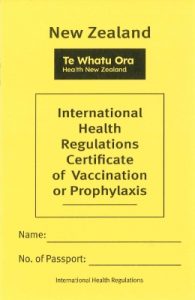
“Unofficial” vaccine booklets: GP’s document the basic travel vaccinations they administer in either of these booklets (provided by the vaccine manufacturers ie GSK & Sanofi).
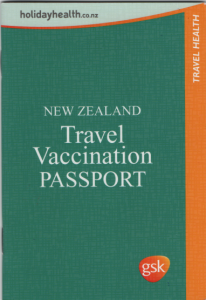
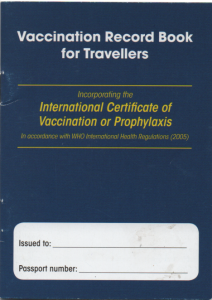
Routine age appropriate Length of Protection # Doses per Course
| Chicken Pox/ Shingles | Life | 2/2 F |
| Measles, Mumps, Rubella | Life | 2 F |
| Hepatitis B |
Life, with + hep B Ab | 3 + 1* |
| Polio |
Life after adult booster | 1 |
| Tetanus, Diphtheria, Pertussis (3:1) | 10 years | 1 F |
| Tetanus, Diphtheria, Pertussis + Polio (4:1) | Polio : life | 1 |
| Gardasil HPV | Long term | 3 F |
| Strep pneumo PCV13 PPSV23 / RSV | Long term / 2-3 years | 1+1 |
| Meningitis ACWY + B | Long term | 1 + 2 F |
Recommended
| Hepatitis A | Possibly life | 2 |
| ** with Hepatitis B | Life, with proven hep B antibody + | 3 + 1* |
| ** with Typhoid | Hep A booster in 1 year | 1 |
| Typhoid | 2-3 years | 1 inj or 3 caps |
| Rabies | Long term | 3 + 1 |
| Japanese Encephalitis | Life or 2-3 years | 1 or 2 |
| E.Coli & Cholera | 6 months | 2 |
| Influenza 4 strain | 1 year | 1 F |
| Tick Bite Encephalitis | 3-5 years | 2 or 3 |
| Yellow Fever | ? booster after 10yr ? life (11 July 2016) | 1 |
** refers to combination vaccines
* dosing schedules vary ie.standard (0,1, 6 months) or accelerated (0, 7, 21 days)
# doses depends on your previous vaccine history and immunity
F = funded vaccine (criteria apply)
- Booster shots are important to follow through for long lasting immunity
- We will send you an email to remind you when these are due
- Hepatitis and rabies vaccines are a lifetime/long term investment in future travel
- Please don’t commence a series of vaccinations if you cannot complete timeously
- If you fail to complete a series you may need to restart the series if you wish to travel at a later stage
- It is ‘never too late’ to complete some vaccines e.g. hepatitis and rabies (we will advise if otherwise)
- There is a follow up and administration fee of $35 per traveller + cost of the booster (e.g. hep B $75, rabies $85, hep A $130, hep A/B $135, strep pneumonia booster $140)
- Please bring in your International Certificate of Vaccination when you come in
Always keep a photocopy or scan of your original ‘yellow book’
New clients: if you lose your previous vaccine records we can request specific antibody marker blood tests at your initial appointment for some of the common travel vaccines. The blood results i.e. antibody levels need to be interpreted in the context of what you may or may not have had (vaccines or disease) in the past. The blood tests are chargeable by the lab e.g. hep B is ~$66 (testing + collection). Lab results take about 24-48 hours (except rabies). We do not have a test for yellow fever antibodies. We cannot request tests for clients we have not consulted.
Existing clients: We are not obliged to provide you with records if we have already handed it to you (ie your vaccination passport). There is currently no national online immunisation database for older records (AIR is a new national register (~2 years) for immunisation activity). We do not hold any electronic records 10 years after administration. Retrieval of archived physical records i.e. > 10 years prior will incur a fee of $50 regardless of whether records are found or not. These will be written in an email to you.
Please email your request direct to doctor@travelclinic.co.nz. No vaccine records will be released over the telephone. Our doctor authorises the release of all vaccine records.
If you request us to reissue a yellow fever vaccine certification the fee is $85 (includes other vaccines). If you require a re-issue of other vaccines in the official ‘yellow book’ the fee is $55 (pre-payment is required prior to us preparing & you collecting or courier). If you chose post, we are not responsible for receipt of the document.
-
Any mammal can get rabies (wild + domestic) and infect humans; the animal may appear well even with the virus in saliva
-
Consider for all travellers for peace of mind (especially children) even if the duration is short to rabies endemic countries and higher risk activities e.g. cycling, trekking, local home-stays, runners, caving and ‘off the beaten’ travel.
-
Rabies is almost always fatal if untreated and ~10% of strays in Thailand are rabid. Bali has a bite rate of as high as 5%
-
Our clinic advises and manages approximately 2+ travellers per month with accidental animal bites; rabies is a risk wherever dogs, cats, monkeys roam freely.
-
New Zealand does not have any rabies, however Australia has rabies.
- NZ has just reported the first death in a returning traveller (30 March 2023).
PRE-TRAVEL Immunisation injection routes may be ID – intradermal or IM – intramuscular
-
Dosing schedules and route of administration vary (ID vs IM : pros and cons).
-
ID is the most popular route: it’s a series of 3 separate doses at a reduced cost of $85 per dose over a few weeks (see picture below for clinical response & these spots will disappear after a few weeks). We follow up with a blood test if clinically necessary to check for rabies virus neutralising antibodies (and a booster in a year for long term immunity).
-
ID rabies is offered daily at dedicated travel clinics and you do not need to ‘gather ‘ other travelling companions (as it’s not cost effective or feasible at non travel clinics)
-
ID rabies is safe, low cost and effective (only if done with the correct expertise)
-
There are other schedule options for ID or IM route ‘off label & accelerated schedules eg a 2 visit (0,7 days) that may need an extra dose for travellers who cannot do the 3 dose series (0,7, 14-21-28 days). You will be advised your options when our doctor assesses you at your initial consultation.
POST-BITE treatment: the treatment for vaccinated travellers is very different to unvaccinated travellers (i.e. a ‘walk in the park’ or a trip-ender! )
Even post-exposure rabies vaccine is hard to come by – and NEVER comes with a guarantee of a reliable manufacturer, well maintained cold chain or correct administration.
All bites, scratches, licks, eyes & mouth (mucous membranes) should be immediately flushed, washed and then disinfected. This is to prevent the virus from accessing the nerve tissue. Once in the nerve, the virus is shielded from the immune system and travels in the nerves (not via blood). Hands and facial areas are highly innervated.
- Vaccinated travellers: preferably make your own antibodies by immunisation in New Zealand, so if ever you are bitten, scratched or licked by a dog, monkey, cat, bat, you will need only two rabies vaccinations (which is easily obtainable) on days 0 & 3 after the animal bite, but you will never need any human rabies immunoglobulin i.e. a blood product injected into the bite wound.
-
Most travellers erroneously believe the only benefit of pre-vaccination is that it ‘buys extra time’
- Unvaccinated travellers: if you are scratched, bitten, licked and unimmunised ie. no antibodies, this is almost certainly a trip ruining experience as the treatment is a lot more dramatic! You must stop what you are doing and travel to a centre where the appropriate post-exposure therapy is available; and request human rabies immune globulin HRIG which needs to be injected into the bite wound to prevent early entry of the rabies virus into nerve endings, then try to time 4 x rabies IM vaccinations required on days 0, 3, 7, 14-28 around your remaining travels. Rabies IM is ~$210 per dose.
- to prevent uncertainty & anxiety ‘ruining’ this trip and future holidays !
- it is difficult to obtain in most destinations where it might be needed
- most important & the greatest benefit is that it totally eliminates the need for blood products i.e. human rabies immune globulin (HRIG) which is virtually unavailable in most countries (e.g. Peru, India, Indonesia, Botswana etc)
- reducing the need for post bite injections vaccines from 5++ to 2 shots
- reducing the post bite treatment period from 28 days to 3 days
- and last of all, it allows for a delay in treatment

Yellow fever is a serious mosquito borne viral infection and occurs in Africa and South America. The Yellow fever vaccine can prevent yellow fever and is only given at approved vaccination centres
You have to have an appointment with the travel doctor as this vaccine is not without risks.
It’s recommended to get the yellow fever vaccine done first (before other travel vaccines) and well before travel.
If you request the yellow fever vaccine the cost of the vaccine is $185 + the cost of the appointment. Please bring in your passport (or a copy), itinerary, a list of all medication you are currently taking, and your ‘yellow vaccination book’ to your appointment.
You definitely need it for your protection if you are visiting Iguazu Falls (Argentina), the Amazon and some cities e.g. Rio state.
Proof of yellow fever vaccination may also be required to enter certain countries e.g. Australia to prevent the introduction and spread of contagious diseases.
It is a very effective (>95%) and safe vaccine & can be given from age 9 months. Consider administering a booster dose for travelers who received their last dose of YF vaccine ≥10 years previously who will be going to higher-risk settings or travelers visiting areas with ongoing outbreaks.
The yellow fever vaccination takes place subsequent to a formal medical consultation as per the New Zealand Ministry of Health Policy for the Approval of Vaccinators.
The vaccination can only be documented in the International Health Regulations Certificate of Vaccination or Prophylaxis issued by the Ministry of Health (i.e. the yellow book)
The vaccine certificate is legally valid 10 days after the injection.
A single yellow fever vaccine is considered to confer lifetime immunity and countries cannot require re-vaccination at entry. The vaccine is good for life, except when it isn’t i.e. re-vaccination may be indicated in specific cases e.g. children vaccinated with the YF vaccine at < age 2, travel to an area with ongoing outbreaks or travel for a prolonged period in an endemic area.
The International Health Regulations concerning yellow fever are unequivocal, and unvaccinated travellers may face denial of entry, vaccination at port of entry or even quarantine in certain circumstances.
This strict control is maintained to ensure that both the individual traveller and the broader communities are protected against outbreaks of this disease.
-
If the vaccine is medically contraindicated, the fee for preparing a yellow fever vaccine waiver is $100.
-
Yellow fever vaccine waivers can only be issued by yellow fever vaccinators with medically supported documents; advancing age is not a reason for a waiver.
International Health Regulation Certificate :”Yellow Book”
We supply you with the official International Health Regulations Certificate of Vaccination or Prophylaxis (NZ Ministry of Health approved). This is included in the initial appointment costs if vaccines are administered. You may be required to show it before you are permitted to enter certain countries. It has space for other pertinent medical details e.g. medical conditions, medication, allergies.
It documents : all immunisations you have had , how long they last and immunity from blood testing e.g. measles, chicken pox, hepatitis A & B, rabies.
Yellow Fever Vaccine
The Yellow Fever Vaccine has been in use since the 1930’s and over 400 million vaccines have been given since then.
The current vaccine is called Stamaril. It is an attenuated (disabled) , live-virus preparation of the 17D strain of yellow fever virus grown in chick embryos and is very effective in preventing the disease. A single dose correctly given confers immunity in basically 95+% of recipients.
This vaccine is given as a single injection given subcutaneously. If a country requires the vaccine for entry, travellers must allow at least 10 days before entering the country for vaccination.
If other live virus vaccines are necessary for travel, they should be completed on the same day as the yellow fever vaccination or 4 weeks apart (we will advise accordingly). Otherwise, travellers may have to wait for one month before other live virus vaccines can be administered. The live-virus vaccines suppresses the immune system, and will reduce the effectiveness of the Yellow Fever vaccine.
This vaccine is a safe and highly effective vaccine against this deadly disease.
200,000 cases of Yellow Fever are estimated to occur yearly on this planet.
-
There is no known treatment to cure the disease.
-
The fatality rate of the disease is reported as 10-50%.
-
Deaths from Yellow Fever disease have occurred in unvaccinated tourists.
Side Effects of the Yellow Fever Vaccine
Reports of serious side effects are extremely rare and generally include fever, headache, and muscle ache. The risks of vaccination are not zero and the current best estimates of the risk from yellow fever vaccination are:
Mild Side Effects
-
Most people will get a slight sore arm
-
3-10% may feel tired, headache, muscle aches, fever for 24 hours starting 3-7 days after the vaccine
-
1% need to curtail regular activities
More Serious Side Effects
-
1 in 130,000 will get immediate hypersensitivity – rash, itching, faint or asthma – this is why you need to wait 20 minutes in the clinic
-
0.09-2.5 per million will get inflammation of multiple organs e.g. lungs, kidney, liver, spleen, skin, blood stream
-
1 in 8 million will get encephalitis (inflammation of the brain)
-
There have been a few deaths reported from the more serious side effects of the vaccine, but this seems to occur in those over 70 years age with certain risk factors
After vaccination, you need to remain at the clinic for 20 minutes in case you have a serious allergic reaction (anaphylaxis). This reaction is rare (about one in a million), but may be very serious. It can be easily treated at the clinic, but is not so easy to treat if it happens while you are driving home.
Symptoms of anaphylaxis include:
-
feeling warm
-
feeling itchy (or developing a rash) away from the injection site
-
feeling faint (especially on standing up) or dizzy
-
a shortness of breath, or a wheeze or cough developing
-
swelling in the throat, face, hands or limbs
-
sudden tiredness
Symptoms usually develop within 20 minutes of vaccination, hence the need to wait in the clinic after receiving the Yellow Fever vaccine.
Occasionally allergic symptoms may occur up to 10 days later. If you develop one or more of the above symptoms within 10 days, immediately call your doctor or go to the nearest casualty department or well equipped medical centre.
Who Should Not Use The Yellow Fever Vaccine
Children younger than 6 months of age, people who have had a previous severe reaction to the vaccine and those who are extremely allergic to eggs should not receive this vaccine. Persons who have a moderate illness (with or without a fever) should postpone receiving this vaccine until they are well.
The following circumstances may increase your risk of reacting badly to the Yellow Fever Vaccine. It is extremely important you notify us if any of the following apply to you:
-
You have a true egg allergy
-
You have had an adverse reaction to Yellow Fever Vaccine before
-
You are, or could be, HIV positive or have AIDS
-
You suffer from a serious weakness of the immune system
-
You have cancer, are taking drugs to control cancer, or are undergoing chemotherapy
-
You have any major liver or kidney disease
-
You are currently taking high dose long term steroid drugs eg prednisone. Recent injections into a joint and steroid asthma puffers are NOT a problem.
-
You are pregnant, or could be pregnant now or in the next three weeks
Yellow Fever Risk Countries
